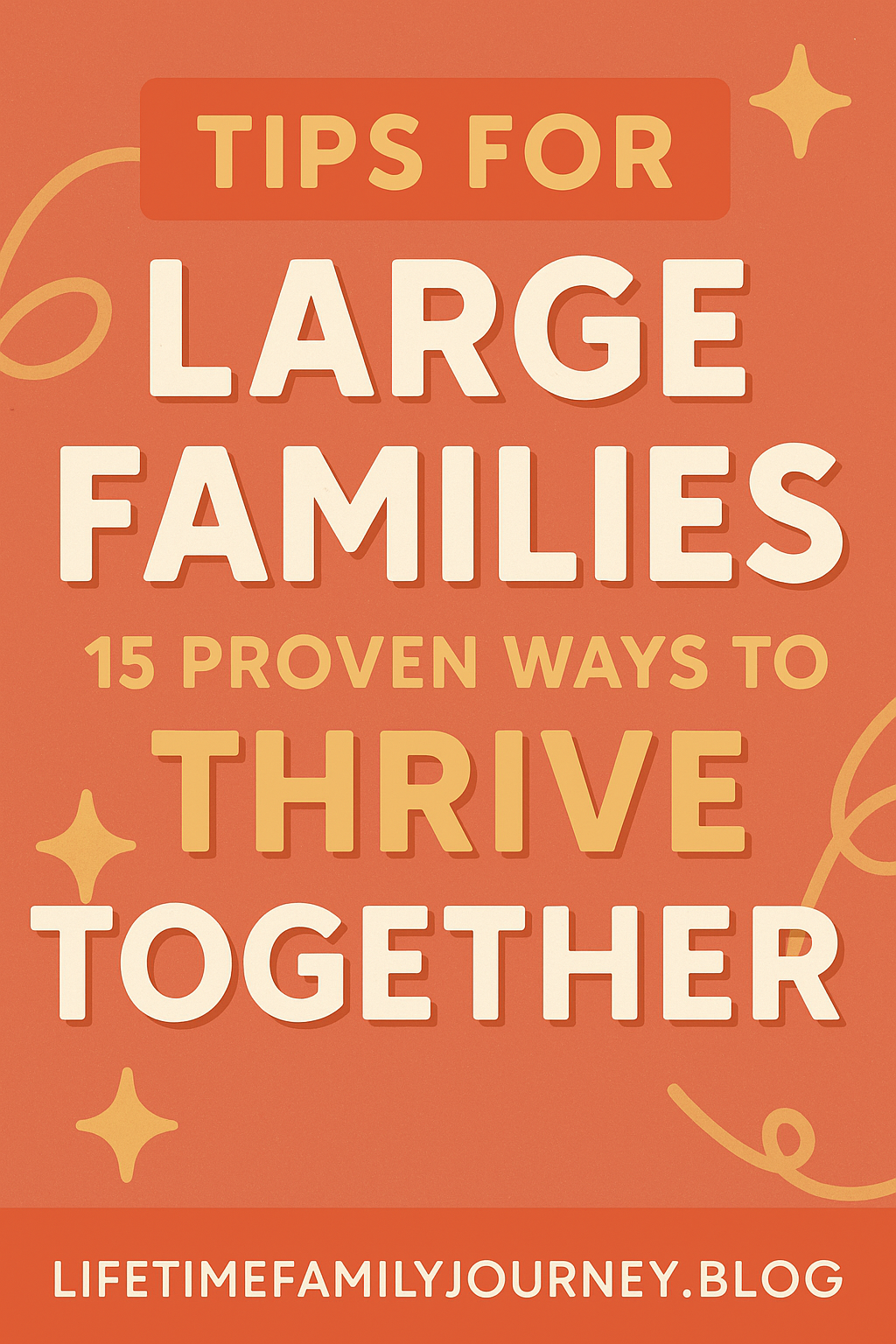Tips for Large Families: 15 Proven Ways to Thrive Together

Tips for large families start with understanding that life with multiple children isn’t just about managing chaos — it’s about creating a thriving ecosystem where everyone feels valued, heard, and loved. The juggling act never stops, but neither does the laughter, the spontaneous dance parties, or those precious moments when you realize your family is your greatest adventure.
I’ve learned that successful large family dynamics aren’t about perfection. They’re about finding systems that work, embracing the beautiful mess, and understanding that some days will be diamonds while others will be coal. The difference lies in having practical tips for large families that help you navigate both scenarios with grace and efficiency.
🏠 Creating Your Family Foundation
The Command Center Revolution
✅ Every large family needs a central hub where schedules, responsibilities, and communication flow seamlessly. This command center approach is one of the most effective tips for large families because it eliminates confusion and creates accountability.
Your command center should include:
- Color-coded family calendar (one color per person)
- Rotating chore assignments
- Weekly meal planning board
- Important contact numbers and emergency information
I placed ours in the kitchen where coffee happens and conversations flow. Within two weeks, everyone naturally gravitated toward checking it daily. The magic wasn’t in the system itself — it was in having one place where our family’s rhythm lived.
Establishing Non-Negotiable Routines
💡 Morning and evening routines become your family’s heartbeat. Without them, you’re constantly reacting instead of proactively managing your day. According to the American Academy of Pediatrics, consistent family routines improve children’s emotional security and behavioral outcomes.
Our morning routine follows a simple pattern: wake up, personal hygiene, make beds, breakfast together, then scatter to individual responsibilities. Evening routine reverses the process — dinner cleanup, family time, individual preparation for tomorrow, then wind down.
The key isn’t rigidity but consistency. Some mornings someone oversleeps or we’re running late, but the basic framework remains. Everyone knows what comes next, reducing decision fatigue and morning meltdowns. These practical tips for large families create predictable structure that children crave and parents desperately need.
💰 Large Family Organization: Budget Mastery
The Power of Bulk Buying and Strategic Shopping
Smart budgeting for large families starts with understanding economies of scale. Warehouse stores become your best friend, but only when you shop strategically. The USDA reports that food costs can account for 10-15% of household income, making meal planning essential tips for large families.
Essential bulk purchases that save money:
- Rice, beans, pasta, and other pantry staples
- Frozen vegetables and fruits
- Cleaning supplies and toiletries
- Paper products
I learned to calculate cost per unit rather than focusing on total price. That twenty-dollar bag of rice might seem expensive until you realize it provides thirty meals instead of three.
Shopping with a detailed list prevents impulse purchases that destroy careful budget planning. I involve the kids in creating shopping lists — they understand our financial boundaries and often suggest creative alternatives when we can’t afford something. These collaborative approaches represent some of the most valuable tips for large families because they teach financial literacy while reducing expenses.
The Hand-Me-Down Economy
👉 Clothing expenses can devastate large family budgets, but strategic hand-me-down systems create significant savings while teaching valuable lessons about reusing and sharing. These sustainable tips for large families benefit both finances and environmental consciousness.
Organize clothing by size and season in clearly labeled bins. When someone outgrows something, it immediately goes into the appropriate future-use container. I’ve saved thousands over the years through this simple system.
Host clothing swaps with other large families in your community. What doesn’t work for your family might be perfect for theirs, and vice versa. These events become social gatherings that strengthen community connections while meeting practical needs.
🍽️ Large Family Meal Planning: Feeding Everyone Well
Batch Cooking and Strategic Meal Preparation
Large family meal planning requires thinking beyond individual meals to weekly systems. Sunday afternoon prep work transforms weeknight dinner stress into manageable routines. Research from FMI shows that families who eat together have better nutritional outcomes and stronger relationships.
Weekly meal prep strategies that work:
- Cook double batches and freeze half for future weeks
- Prepare versatile base ingredients (cooked ground beef, chopped vegetables, cooked grains)
- Plan meals using similar ingredients to reduce waste
- Involve everyone in preparation appropriate to their age and ability
One pot meals become lifesavers. Chili, soup, casseroles, and stir-fries feed everyone with minimal cleanup. I keep a rotating list of twenty simple recipes that use common ingredients and require less than thirty minutes active cooking time. These efficient cooking tips for large families save both time and sanity during busy weeknights.
Teaching Kitchen Responsibility
🔍 Large families provide natural opportunities for teaching life skills through meal preparation and cleanup. Age-appropriate kitchen responsibilities create competent, confident children while reducing parental workload.
Young children can set tables, wash vegetables, and help with simple mixing tasks. Older kids can handle actual cooking responsibilities, plan weekly menus, and manage grocery lists. Teenagers can take full responsibility for preparing family meals on designated nights.
The goal isn’t perfection but participation. When everyone contributes to family meal systems, complaints about food choices dramatically decrease. People appreciate what they help create.
⏰ Family Time Management: Making Everyone Feel Important
Individual Attention in a Crowded House
One of the biggest challenges in large families is ensuring each child feels individually valued and heard. Family time management requires intentional strategies for creating meaningful one-on-one connections. The Centers for Disease Control and Prevention emphasizes that consistent, positive parent-child interactions support healthy development.
Simple ways to create individual attention:
- Take one child with you on errands and use drive time for conversation
- Implement monthly “special days” where each child gets undivided attention
- Create bedtime routines that include individual check-ins
- Use natural opportunities like walks or cooking together for deeper conversations
These don’t require elaborate planning or significant time investment. Ten minutes of focused attention often means more than hours of distracted interaction. These relationship-building tips for large families create stronger bonds without requiring additional financial resources.
Managing Sibling Dynamics and Conflict Resolution
🚨 Conflict is inevitable in large families, but teaching healthy resolution skills creates stronger relationships and more peaceful homes. These conflict management tips for large families prevent small disagreements from escalating into major family disruptions.
Instead of constantly mediating disputes, teach children conflict resolution skills they can use independently. The basic framework involves stating the problem, listening to all perspectives, brainstorming solutions together, and agreeing on action steps.
Natural consequences work better than arbitrary punishments. When siblings argue about sharing something, remove the item until they develop a sharing plan. When cleanup doesn’t happen, activities requiring clean spaces get postponed until the work is complete.
Building Family Identity Through Traditions
📌 Shared traditions create family identity and belonging that extends far beyond childhood. These don’t need to be elaborate or expensive — consistency matters more than complexity. Creating meaningful traditions represents some of the most important tips for large families because they build lasting memories and strengthen family bonds.
Weekly family game nights, seasonal activities, holiday traditions, and even simple daily rituals like family dinner conversations create the foundation for lifelong memories and strong family bonds.
Our home cleaning tips create weekly traditions where everyone participates in maintaining our shared space. Cleaning becomes family time rather than individual drudgery.
I’ve discovered that children remember traditions more than gifts. The weekly pizza and movie night, the annual camping trip, the special birthday breakfast — these become the stories they tell their own children decades later.
🎯 Advanced Strategies for Large Family Success
Teaching Independence and Responsibility
Large families provide natural laboratories for developing independence and personal responsibility. Children learn to problem-solve, contribute to family functioning, and develop confidence through meaningful participation in family life.
Age-appropriate responsibilities should gradually increase, preparing children for eventual independence while contributing to current family needs. This isn’t about creating child labor but about raising competent, confident individuals who understand their value in family systems.
Progressive responsibility assignments:
- Ages 3-5: Personal hygiene, simple cleanup tasks, feeding pets
- Ages 6-9: Laundry folding, meal preparation assistance, organizing personal spaces
- Ages 10-13: Complete meal preparation, yard work, deeper cleaning tasks
- Ages 14+: Financial responsibility for personal items, car maintenance, teaching younger siblings
Creating Calm in the Chaos
💡 Large families require intentional strategies for creating peaceful moments amidst the natural energy and activity of multiple children.
Designate quiet zones where anyone can retreat for solitude or focused work. Implement “quiet time” even for children who no longer nap — everyone benefits from scheduled downtime.
Music helps regulate family energy levels. Upbeat music during cleanup time motivates activity, while calmer music during homework or family reading time creates focused atmosphere.
Our positive mindset habits include family gratitude practices that shift focus from problems to appreciation, creating more positive family dynamics overall.
🌟 Maintaining Parental Sanity and Partnership
Self-Care Isn’t Selfish in Large Families
Parents in large families often neglect personal needs while focusing entirely on children’s requirements. This creates burnout, resentment, and decreased effectiveness in family leadership.
Essential self-care strategies for large family parents:
- Schedule personal time daily, even if only fifteen minutes
- Maintain friendships and interests outside family responsibilities
- Exercise regularly, even if it’s walking around the neighborhood
- Pursue personal growth through reading, learning, or creative outlets
I learned that taking care of myself improved my ability to care for everyone else. When I’m rested, patient, and emotionally healthy, our entire family functions better.
Strengthening Marriage in the Middle of Mayhem
👉 Strong marriages create stable foundations for large family success. Children thrive when parents maintain loving, respectful relationships with each other.
Date nights don’t require expensive babysitters or elaborate planning. Walking together after children’s bedtime, sharing coffee before anyone else wakes up, or having meaningful conversations during car rides maintains connection despite busy schedules.
Our family fishing adventures create opportunities for couple time while including children in family activities. Finding activities everyone enjoys strengthens both marriage and family bonds.
📚 Educational Approaches for Large Families
Efficient Homework and Study Systems
Managing multiple children’s educational needs requires systematic approaches that prevent homework time from becoming family chaos.
Create designated study spaces with necessary supplies readily available. Establish consistent homework times when everyone focuses on educational tasks simultaneously. Older children can help younger siblings with appropriate guidance and boundaries.
Homework management tips for large families:
- Use timers to create focused work periods
- Rotate parental assistance based on subject strengths
- Create quiet study environments free from distractions
- Celebrate educational achievements to maintain motivation
Encouraging Individual Talents and Interests
🧠 Each child possesses unique talents and interests that deserve individual attention and development. Large families sometimes struggle to nurture individual gifts while managing overall family needs.
Expose children to various activities and opportunities, then support deeper involvement in areas where they show interest and aptitude. This might mean different extracurricular activities for different children rather than everyone participating in the same things.
Budget constraints require creative solutions. Community programs, library activities, and informal learning opportunities often provide quality experiences without significant financial investment.
🏆 Celebrating Success and Managing Challenges
Recognizing Individual and Family Achievements
Large families provide numerous opportunities for celebration and recognition. Academic achievements, personal growth milestones, acts of kindness, and individual accomplishments deserve acknowledgment and celebration.
Ways to celebrate in large families:
- Family announcement times during dinner
- Special treats or privileges for achievements
- Photo documentation of important moments
- Sharing successes with extended family and friends
Recognition doesn’t require expensive rewards. Often, sincere acknowledgment and family celebration mean more than material gifts.
Handling Difficult Seasons and Challenges
🚨 Every large family experiences difficult periods — illness, financial stress, behavioral challenges, or major life transitions that disrupt normal routines and create additional stress.
During challenging times, simplify expectations and focus on essential needs. Meal planning might shift to simple, quick options. Household responsibilities might be redistributed based on current capabilities. Academic expectations might be adjusted to accommodate family circumstances.
Our school readiness strategies help navigate annual transitions that affect entire family functioning. Preparation and flexibility prevent crisis management during predictable changes.
The key is remembering that difficult seasons are temporary. Maintaining family connection and support during tough times often strengthens relationships for the future.
🎉 Building Community Connections
Creating Support Networks with Other Large Families
Large families benefit enormously from connections with other families facing similar challenges and joys. These relationships provide practical support, emotional encouragement, and opportunities for children to develop friendships with peers who understand large family dynamics.
Ways to connect with other large families:
- Join local homeschool groups or large family organizations
- Participate in community sports leagues or activity groups
- Attend religious or community organizations that welcome families
- Create informal playgroups or family activity partnerships
These connections often lead to practical benefits like childcare exchanges, bulk buying cooperatives, and shared resources that reduce individual family costs while building community relationships.
Teaching Children to Navigate Social Situations
Children from large families sometimes feel different from peers who come from smaller families. Teaching them to confidently explain their family structure and appreciate their unique experiences builds self-esteem and social skills.
Help children develop age-appropriate responses to common questions about large family life. Practice positive ways to describe family dynamics that emphasize benefits rather than focusing on challenges or differences.
💝 Long-Term Vision for Large Family Success
Preparing Children for Future Independence
The ultimate goal of effective large family management is raising children who become competent, confident, caring adults capable of creating their own successful families and contributing positively to society.
Long-term goals for large family children:
- Strong work ethic developed through family responsibilities
- Excellent relationship skills learned through sibling interactions
- Financial literacy gained through family budget participation
- Leadership abilities developed through helping younger family members
These skills develop naturally in well-functioning large families where children participate meaningfully in family life rather than being passive recipients of parental services.
Creating Lasting Family Legacy
👉 Large families have unique opportunities to create multi-generational impact through shared values, traditions, and relationship patterns that extend far beyond immediate family members.
The investment in building strong family systems pays dividends for generations. Children who grow up in loving, well-organized, financially responsible large families often replicate these patterns in their own adult lives.
Document family stories, traditions, and wisdom through photos, videos, written records, or family history projects. These become treasured resources for future generations and help maintain family identity as children mature and create their own families.
Our music and family connection experiences demonstrate how shared interests and activities create lasting bonds that continue into adulthood.
📝 Final Thoughts: Embracing the Large Family Journey
Living in a large family isn’t for everyone, but for those who choose this path, the rewards far outweigh the challenges. Yes, there are more schedules to coordinate, more personalities to understand, more meals to prepare, and more laundry to wash. But there are also more hugs to give, more laughter to share, more memories to create, and more love to experience.
The strategies and tips for large families outlined here aren’t rigid rules but flexible frameworks that can be adapted to your family’s unique needs, values, and circumstances. What works perfectly for one family might need modification for another.
The most important tips for large families are simple:
- Focus on connection over perfection
- Build systems that support your values
- Teach children to contribute meaningfully to family life
- Take care of yourself so you can care for others
- Remember that this season of intensive family life is temporary but precious
Some days will feel overwhelming. Some nights you’ll wonder if you’re doing anything right. Some moments you’ll question whether you have enough energy, patience, or resources for everyone who needs you.
But then someone will spontaneously hug you and say thank you. Or you’ll overhear siblings helping each other solve a problem. Or you’ll watch your children demonstrate kindness, responsibility, or resilience they learned through large family experiences.
Those moments remind you that raising a large family isn’t just about surviving the chaos — it’s about creating something beautiful, meaningful, and lasting that extends far beyond your immediate household.
The world needs more families who understand that love multiplies rather than divides, that shared resources can meet everyone’s needs, and that the investment in raising multiple children well creates positive ripple effects for generations.
Your large family is a gift — to each member within it and to the broader community that benefits from the adults you’re raising. Embrace the journey, implement systems that work for your unique situation, and remember that imperfect love shared generously creates the strongest families of all.
Explore More from Our Family of Blogs
Mountains Will Move
Faith-based encouragement for everyday families.
Everyday Exposed
No-filter truth hub for critical thinking and clarity.
Thank you for being part of the community. God Bless you and your family.


